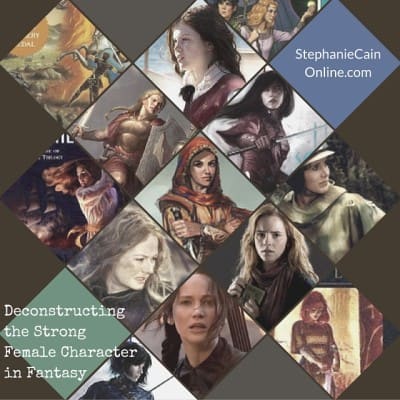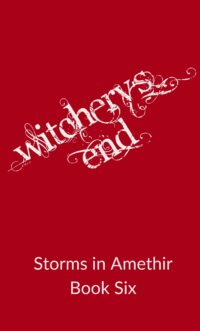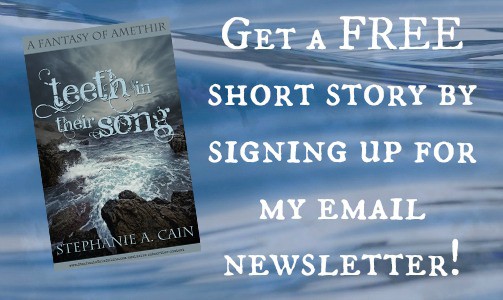Strong Female Character is a term we’ve heard a lot in the past few years. A lot of people seem to think a Strong Female Character is a girl who kicks ass and takes names, doesn’t need anyone, and likes weapons and black leather. I have a slightly different definition of a Strong Female Character.
Strong Female Character = Strong Character Who Is Female
Strong Character = A Character Who Is Fully Realized and Has Agency in His/Her Own Story
[ctt title=”A Strong Female Character is a female character who is fully realized and has agency in her own story.” tweet=”A Strong Female Character is a female character who is fully realized and has agency in her own story. via @stephanie_cain” coverup=”hdBfj”]
I’ll talk a little bit more about what I mean by this, and I’ll give some of my favorite examples along the way.
A Strong Character is a Fully Realized Character
A fully realized character is someone who
- has clear motivations
- wants something
- is flawed
For example, Hermione Granger. She is motivated by knowledge and learning. She wants to be a fully-fledged witch and be accepted as such despite being Muggleborn. She also wants her best friend Harry Potter to survive his many encounters with Voldemort. Is she flawed? Absolutely—just ask anyone who’s ever called her a know-it-all.
Going back a couple of decades, Eilonwy of the red-gold hair is motivated by her eagerness for adventure. She wants to be seen as equal to her male counterparts and to help Taran of Caer Dallben (despite his seeming inability to see her as equal). Her flaw is her temper, which tends to get the better of her at times.
You notice how I don’t say anything in here about kicking butt and taking names?
That’s not to say a strong character should never kick butt and take names. I like Lara Croft and Katniss Everdeen as much as the next person, and I write a few girls myself who kick butt and take names. But that isn’t the be-all and end-all of a strong character.
In my own fiction, Azmei Corrone begins her fictional journey as a princess who, while capable of using a sword in self-defense, doesn’t love it. She is motivated by her kingdom’s need for peace. She wants to help create that peace by agreeing to marry a prince she’s never met. Her flaw is her inability to read people well enough to make good decisions about whom to trust. Later in her story, she definitely grows into a kicking-butts-and-taking-names character, but she’s still motivated by her kingdom’s need for peace, as well as a strong desire to protect her family.
A Strong Character Has Agency in Her Own Story
 No one wants to read a story about a person who does nothing but react to the events in her life. Alanna of Trebond’s story would be totally different if she hadn’t taken the initiative to disguise herself as a boy and train to become a knight. What if Seraphina had gone blindly along with her father’s decision that she not create music or bring attention to herself?
No one wants to read a story about a person who does nothing but react to the events in her life. Alanna of Trebond’s story would be totally different if she hadn’t taken the initiative to disguise herself as a boy and train to become a knight. What if Seraphina had gone blindly along with her father’s decision that she not create music or bring attention to herself?
It’s true that the character has to react to an inciting incident. That’s part of the structure of a novel, after all. Katniss’ reaction to her sister’s being picked as tribute is to volunteer herself. But once she has volunteered, she determines to survive the Hunger Games and devises a strategy to do that. Once she’s in the arena, she continues making decisions—to manipulate the cameras for medicine, to fool Peeta, and so on. Katniss takes a proactive role in her own life. She seizes agency in a world where there isn’t much agency to go around.
Think about what makes a good story: a character wants something, is faced with an obstacle, and has to overcome that obstacle to get what she wants.
Some of My Favorite Strong Female Characters
Eowyn of Rohan – Tolkien gets a lot of guff for having so few female characters, but he does a lot right with Eowyn, even with just a little bit of screen time. She’s frustrated with her role in life, playing nursemaid to a faltering king, but she does what she considers her duty. But in the background, you can tell she’s been training with a sword, because when she gets a chance to put on armor and ride to the defense of her country, she does so, defying the king she loves in order to serve him the best way she can.
Bonus content: ”I Am No Man” Doesn’t Cut It: The Story of Eowyn
Paksenarrion Dorthansdotter – The star of Elizabeth Moon’s The Deed of Paksenarrion– which is my second favorite series, after LotR – is definitely a strong female character, despite a lot of bad stuff being thrown at her along the way. If you haven’t read this, I don’t want to spoil it for you, but in the very first scene, Paks runs away from home rather than be forced into an arranged marriage. She joins a mercenary company and learns how to fight, and while she is occasionally reduced to reacting to events instead of planning her own course, there’s a plot reason for some of that. The audiobook version, by the way, is well done.
Seraphina – I only read Seraphina by Rachel Hartman this summer, after a recommendation at a writer’s conference, but I’m so glad I did! Seraphina doesn’t want much in life—just to make music and to keep her secrets from becoming common knowledge. Her father tries to keep her from being noticed, but she refuses to remain hidden. She pursues her dream of making music and becomes integral in foiling a plot against the kingdom.
Lucy Pevensie – I know this may seem weird, but Lucy’s a great character. She tells the truth, even when it’s unpopular, and she stands up for herself, even when her brother calls her a liar. In later books, she has the courage to follow Aslan when no one will go with her. If that isn’t agency, I don’t know what is.
Alanna of Trebond – The first Alanna book was published when I was nine. Just a couple of years earlier, after seeing Return of the Jedi in the theater, I had cut off all my long hair so I would look more like Luke Skywalker. (An added benefit was that I would also look like Frodo Baggins, another of my early heroes. And no, I’m not sure why I didn’t want to emulate Leia, who was pretty badass in her own right.) Probably to my mother’s relief, I didn’t cut my hair again because Alanna did. But for the first time I really had a girl character to identify with who was, unlike Eowyn, the star of her own story. I pretty much grew up alongside Alanna, so Tamora Pierce is one of those authors I will always buy in hardcover as a thank you for giving me a lady knight to admire.
[ctt title=”A discussion & definition of Strong Female Characters in #fantasy” tweet=”A discussion & definition of Strong Female Characters in #fantasy via @stephanie_cain” coverup=”WvP5L”]
These are just a few of my favorite Strong Female Characters, but there are dozens more out there. Who are your favorite SFCs?




RT @stephanie_cain: Deconstructing the Strong Female Character in Fantasy: http://t.co/t8G6tSd201 #amwritingfantasy #strongfemalecharacter
@stephanie_cain Spider-Girl, Batgirl, Harper Blaine from the Greywalker series by Kat Richardson and Spider-Gwen.
A bit late and very off-topic, but I was just driving by …
“A strong character is a fully realized character, which includes being flawed”: why?
I’m aware of the how-to-write folklore, so I’d like to skip over those platitudes. It seems Fantasy has settled on a formula where stories are about a protagonist overcoming or “owning” a flaw, but this need not be the case for all genres. (Arguably, it’s not the case for ancient epics either; flaws, where important, were immutable and the source of tragedy)
The classical who-dunnits have central characters with inconsequential flaws. The stories aren’t about how Hercule Poirot or Sherlock Holmes change into better people. Regardless, the characters are sufficiently “strong”– though not necessarily fully realized, and there can be a difference– to allow a lot of reinterpretation. You have your ol’ upstanding Victorian Holmes. Or the OCD version (Monk). Or the jerk version (Dr. House). Or Holmes with flaws essentially removed, a perfect Rational/Humanist hero, in a couple of stories by Neil Gaiman of all people (<3 u Neil!). The way people can plug and play "flaws" into a Holmes mold is proof that the flaws are inconsequential for this character's draw.
And I'm not ready to concede even Fantasy to the flaw-police. Not all characters are the protagonist, not all characters are in the position of their change being the story. Why couldn't you have strong mentor characters, for example? It's not the flaws that make them strong. It's just their agency.
And in an attempt to veer this closer to topic, here's a favorite character from SF who I think is a strong female character: Elizabeth Shaw from Prometheus. (I loved that film, I can't hear you, na-na-na-na!) She has clear motivations, she wants something; she has flaws too, but those aren't the story. Rather, she's there to embody supposed opposites, spirituality and scientific enquiry. She's there to be an idealist in a world of greed and powerlust, and she's strong not because she changes, but because she is plucky in her resolve. It's a worthwhile arc to explore too, sometimes, after one tires of all the change-driven derivatives. The opposite of running fast just to stay still; sometimes staying put can get you places.
Cheers.
Hi! Thanks for stopping by. :)
I guess I say a strong character should be flawed because I think characters without flaws are boring. Sometimes a character’s story involves NOT overcoming her flaws, but succumbing to them. On the other hand, I’ll admit that I AM a fan of seeing characters overcome their flaws.
I don’t think that overcoming flaws should be a key plot point, necessarily. As you say, the point of the Holmes stories isn’t that he overcomes his flaws. But his flaws make him more interesting, don’t they? How could such a brilliant man become an addict, for instance? It gives him depth he wouldn’t have otherwise.
I also agree with you that mentor characters don’t have to be flawed. On the other hand, Haymitch and Hagrid are both great mentor characters who are also deeply flawed in some ways–and again, for me, those flaws make them more interesting. :)
So sure, I think that in the hands of a good writer, you don’t necessarily need flaws to have a good protagonist.
One of my current favorite female characters is Clarke Griffin from the CW show The 100. She’s deeply flawed. She doesn’t know how to forgive, and she leads with her heart, even when a rational decision appears to be a better one. Her heart has led her to kill people, including in one instance a person she loved, and yet when she makes these choices, I feel her pain alongside her. When she fails to forgive someone, I’m frustrated, but I understand because I know this is her weakness, and it’s right in character for her.
I’m not sure if I’m making sense here, and maybe I’m not convincing you of anything, but hopefully you get what I mean! :)
And now I’m going to go find Prometheus so I can watch it.